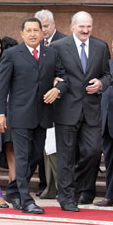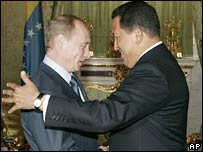Getting our "isms" right...
Seems I can't win: Chavistas regularly criticize me for calling the government an autocracy. Opposition people regularly bawl me out for refusing to call it a dictatorship. My choice of words may seem capricious, but actually a lot of thought has gone into it. Being a word-oriented kind of guy, I'm always annoyed at the careless way some of the "isms" are tossed around in debate. So I'll lay out a little taxonomy of what I see as the four key words on the liberal-totalitarian axis, to try to bring some precision to the discussion.
Constitutional Liberalism: A form of government that protects individuals' political liberties by dividing state power between genuinely independent institutions empowered to check and balance one another. Though it's often used as a synonym for "liberal democracy" there's no necessary link between the two: Britain practiced Constitutional Liberalism for hundreds of years before instituting democracy. In constitutional liberalism, state institutions display strong functional independence, and act under the authority of law.
Examples: Chile, Norway, Japan, South Africa, Canada (just to pick one for each continent.)
Autocracy: A form of government where all state power is concentrated in a single person. Formally independent state institutions are, in reality, dependent on the autocrat. Authority stems from the leader, not from the laws. An autocrat centralizes state power, but political entities outside the state retain capacity for independent action. Individual political liberties are curtailed but not entirely eliminated.
Examples: Venezuela under Chavez, Argentina under Peron, Russia under Putin, Egypt under Nasser, Singapore under Lee Kwan Yew.
Authoritarianism: Roughly synonymous with dictatorship, a form of government where all political activity is dominated by a single actor, through violence when necessary. The basic difference between autocracy and authoritarianism is that an authoritarian regime extends control not just over the state, but over all political activities in society. Political opposition is systematically repressed through the application of state power.
Examples: most traditional dictatorships in Latin America (Gomez, Trujillo, Porfirio Diaz, Batista and a very long etc.), also Iran under the Shah, Zaire under Mbutu, Indonesia under Suharto.
Totalitarianism: A form of government where all social life is dominated by a single actor through the systematic use of violence. Though often misused as a rough synonym of "authoritarianism," totalitarianism is something fundamentally different. Totalitarian regimes seek to control all aspects of social life, not just politics. Whereas authoritarianism is "rational" - in the sense that it does what is necessary to maintain political power and no more - totalitarianism is not.
Examples are few: France under the reign of terror, Hitler, Stalin, Pol Pot, and North Korea under the Kims.
Obviously these are "ideal types" - not every regime fits neatly in a single category. Fidel's Cuba falls into ambiguous territory beyond traditional dictatorship but short of the mass violence associated with Totalitarianism. As presidential power expands beyond the reach of congressional oversight under Bush the Younger, the US gets further away from constitutional liberalism as traditionally understood - but no sober analysts would call the US an autocracy.
Chavez, on the other hand, is not a borderline case at all. He's an autocrat through-and-through. Though he's made some worrying moves in the direction of authoritarianism, it's perfectly clear he's far from controlling all political life in the country. It's equally clear that he's centralized all
state power under his authority.
Please comment responsibly:
|
Do you want Open Threads?
Some of you have been writing in to complain that the comments section is going far off-topic too often. One possible solution is to start running "Open Threads" - posts without a topic meant for general discussion in the comments section. If I start running them, I'll also start erasing off-topic comments in the other threads. Think this is a good idea?
Current Results
Please comment responsibly:
|
Dissent = Treason
Fidelismo 101 in action:
"The presidential elections are coming and the opposition is all out of whack, divided, diminished...but we are not fighting against the Venezuelan opposition, but against the empire, its lackeys and its pawns."
-Hugo Chavez
Please comment responsibly:
|
Thinkcrime update
RSF Warning: Dissing the powerful might be hazardous to your freedom
Reporters Without Borders voiced concern after the state prosecutor’s office laid a charge of ”insult” against Napoleón Bravo of Venevisión TV on 8 February 2006, since it would be the first to be tried under draconian criminal law reform.
The organisation said it feared damage to press freedom, as the law, promulgated on 16 March 2005, steps up sanctions for press offences.
“With the Napoleón Bravo precedent, the application of the criminal code reform will seriously compromise the future of press freedom in Venezuela, since this law is so harsh towards the media,” said the press freedom organisation.
“Moreover the journalist is likely to be sentenced on matters dating back to before the law came into force, trampling on the fundamental principle of non-retroactivity,” it added.
Do note, Napoleon Bravo (whom I don't much respect as a journalist, but that's neither here nor there) is not being tried for defamation. He's being tried for insulting state officials,
desacato in Spanish.
There's a
big difference. The state is not going after him for making an untrue statement of fact. The state is trying him for expressing an opinion, for saying what he thinks.
Desacato norms
have been condemned repeatedly by international human rights groups. The trend in Latin America has been for such laws to be
struck off the books. The few countries that have them tend to no longer enforce them. And for good reason: penalizing opinions comes close to instituting thinkcrimes.
Only Venezuela is going in the other direction,
broadening its desacato provisions, stiffening penalties, and now enforcing the new laws.
Please comment responsibly:
|
Missing the Point of Chavez's Anti-American Rants
The
Washington Post runs this piece about
Thomas Shannon's probably doomed attempt to de-escalate the Caracas-Washington pissing match. Key bits:
After an especially ugly week in the hostile relationship between the Bush administration and the government of Venezuelan President Hugo Chavez, Venezuela's envoy here tried yesterday to salvage some civility, saying his country sought "mature and rational relations" with Washington and would remain a "reliable" source of energy to all foreign customers, including the United States.
The State Department responded in kind, with its spokesman saying Washington was "open to a good relationship with Venezuela" and hoped for a "positive one." The spokesman, Sean McCormack, said that the two countries were cooperating in the fight against drugs and that the administration was prepared to work with governments across the political spectrum, including those with "left-of-center" views.
While not exactly wrong, I think this kind of reportage, focusing on the diplomatics of the Chavez-US tiff, misses much of the point. Chavez's rhetorical anti-Americanism is more about domestic politics than about foreign policy. Taken directly out of Fidel's playbook, its basic goals are to deflect attention from the revolution's failures and, more perniciously, to delegitimize dissent.
As
Teodoro Petkoff explains when you tar all dissidents as foreign agents, you make questioning the government tantamount to treason. This is obviously what Chavez is up to: he's already said that, in December, the presidential election is going to be between him and the gringos. This kind of rhetoric has very little to do with what the US actually says or does, and everything to do with positioning himself to repress those who disagree with him (henceforth to be known as CIA agents) and extending autocratic control over society. The idea that there's some change in US policy that might defuse Chavez's vitriol is just naive: Chavez needs the US bogeyman to keep himself in power. You'd think that after a half-century facing this tactic in Havana, the Americans would've caught on.
Please comment responsibly:
|
Brothers...
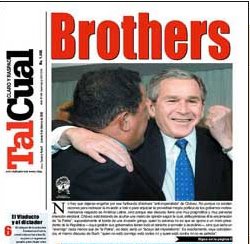
Teodoro Petkoff picks up
on an old hobby horse of mine noting the similarities between Bush and Chavez lurking just behind the official animosity. Key graf:
Chavez is trying to manufacture a reality which casts him as the incarnation of "the fatherland", supposedly on the brink of a gringo invasion. In that case, those who object to him don't oppose a mere president of the republic - whose work all citizens have the right to scrutinize - but becomes an "enemy" of nothing less than "the fatherland", a "lackey of imperialism." Which, funny coincidence, ressembles nothing so much Bush's own discourse: "you're either with us or against us" and those who are against us are unpatriotic...Chavez and Bush are two sides of the same authoritarian, intolerant and arrogant coin. They feed back on one another.
I know I really shouldn't stray into US politics so much - but I can't help but notice that GOP tactics are getting more and more reminiscent of the kind of stuff chavistas do. Remember the "mano pelua" that mysteriously altered the constitutional text between the time it was voted on and the time it was published? I thought this kind of shenanigan couldn't imaginably happen in a first world country.
Oh, but I was wrong.Senate Majority Leader Bill Frist and House Speaker Dennis Hastert engineered a backroom legislative maneuver to protect pharmaceutical companies from lawsuits, say witnesses to the pre-Christmas power play. The language was tucked into a Defense Department appropriations bill at the last minute without the approval of members of a House-Senate conference committee, say several witnesses, including a top Republican staff member.
On the right-left axis, Republicans and Bolivarianos are on opposite extremes. When it comes to political tactics, they're pretty much on the same page.
Please comment responsibly:
|
The Devil Wears Cartier: Larry Birns and COHA's Indecent Game Against Maria Corina Machado
Normally, I stick to a policy of ignoring the tiresome propagandistic tirades that ooze out of Larry Birns' fringy-lefty Council on Hemispheric Affairs, but his
latest COHA-culo riled me just enough to respond. Birns trots out all the usual ruses - the hysterical anti-Americanism, the rank class-baiting, the tortured re-interpretations of Venezuelan law - to persuade us that locking up signature-gathering dissidents for over two-decades is a perfectly reasonable thing for a democratic government to do. While the usual stream of anti-Sumate invective is too tedious to take apart here, I want to dwell on one aspect that struck me as both new and particularly deceptive:
Birns affirms that, for all intents and purposes, Sumate is a political party and that, under article 25 of Venezuela's
Law of Political Parties, Public Meetings and Demonstrations, (LPPRPM) political parties are not allowed to receive funding from foreign sources. Sumate broke the law,
ergo, they have to face the consequences.
There's
so much wrong with this argument it makes your head spin.
In ordinary language, a political party is an organization that
seeks political power by nominating candidates for election. Sumate does not do that, has never done that, and has no intention to do that. By Birns' definition, the
League of Women Voters would be a political party, as well as the
ACLU, and any other organization that participates in public life as it relates to the electoral process even when it does not seek election.
As a matter of Venezuelan law, political parties constitute themselves as such by formally registering with CNE. This procedure allows them to nominate candidates for elections, and binds them to a particular set of rules set out in LPPRPM. Sumate isn't registered as a political party. Instead, Sumate is an "asociación civil", a legally registered NGO. There is no legal ban on NGOs receiving foreign funding - they do that all the time.
But even if, by some bizarre re-interpretation of Venezuelan law, you decide that Sumate is a political party, Birns' argument is absurd. Article 25 of the LPPRPM establishes an obligation not to accept foreign funding, but does not establish criminal penalties for breaking that obligation. This is significant, since the law
does establish criminal penalties for other violation. For instance, placing campaign posters on public property is supposed to land you in jail for 1 to 15 days. (Oh, the irony!) Nowhere in LPPRPM will you find any justification to jail someone for 20+ years - the penalties typically include fines or jail sentences of no more than a month.
(It also bears noting that, unlike Sumate, MVR very certainly
is a political party and has
accepted over a million dollars in foreign campaign contributions, as shown by Spanish investigative magistrate Baltazar Garzón. If Birns thinks Maria Corina Machado should be jailed for 23 years on the basis of LPPRPM, it's hard to fathom why he doesn't think Chavez should receive similar punishment.)
Since, obviously, LPPRM is such a weak instrument to base a prosecution on, the Prosecutor General is basing his accusation on article 128 of the
Venezuelan Penal Code which bars conspring with foreigners against “Venezuela's republican institutions,” a charge that seems to imply Sumate wanted to impose a monarchy. The wording is, obviously, vague in the extreme...and weirdly unrelated to what Sumate actually did.
This whole hubbub, lest-we-forget, stems from Sumate's campaign to help citizens exercise their right to seek the recall of elected officials as set out
article 72 of the constitution, and I do mean the 1999 constitution, y'know, the one Chávez calls the best in the world, the one his supporters drafted and he campaigned for...that one.
MCM's predicament is decidedly kafkaesque - threatened with decades in jail for undermining the republic by applying the constitution her persecutors wrote. It reminds me of Teodoro Petkoff's quip that the 1999 constitution reads more and more like a subversive pamphlet, so distant is its word and its spirit from official practice.
So no, Larry, the devil doesn't wear Prada...
he wears Cartier.
Please comment responsibly:
|
Grab bag
Gilberto Landaeta, allegedly the #2 guy in Danilo Anderson's one-time extortion racket, is taken off Anderson's murder investigation, to "spend more time with his other cases." Yoraco Bauza, another alleged Anderson co-racketeer, now leads the case.Tony Blair calls on Venezuela to respect the norms of the International Community. Chavez tells him to piss off.Luis Vicente Leon thinks 55% of Venezuelans want to vote for someone other than Chavez. He doubts any single oppo candidate can bring together that many votes, however.The Prosecutor General's Office is asking for a 23 year sentence for Sumate leaders, in a pre-trial hearing that violated constitutional due process from literally the first day. EADS-CASA says the sale of 12 Spanish military transport planes to Venezuela is "not viable" if US proprietary technology has to be replaced, since it would entail virtually redesigning the whole plane. The announcement endangers the sale of Spanish naval patrol ships to Venezuela.
Please comment responsibly:
|
What ever happened to Article 315?
Back in 1999, I was a relatively naive 24 year old, and I'll confess I was genuinely conflicted about how to vote in the referendum on the new constitution. While I hated the expansion of presidential powers, the lengthened presidential term, and the introduction of immediate reelection, I couldn't help noticing
article 315. It reads:
In anual spending budgets, at all levels of government, clear and specific objectives for each budget item shall be established, along with the concrete goals intended, and the public officials responsible for achieving such goals. Goals shall be established quantitatively in terms of performance benchmarks, insofar as it is technically possible to do so. The executive branch, within six months after the end of each budget year, shall present to the National Assembly an accountability report and a balance sheet on the execution of the spending budget for the preceding fiscal year
The article represents a thoroughgoing revolution in Venezuelan fiscal management, a clean break from the past, and a recipe for hugely increased accountability and vastly more effective public spending...or it would have, if it had ever been implemented. Six years on, I can only shake my head at my own naivete for having thought a Chavez government would take such obligations seriously.
Clear and specific goals? Quantitative benchmarks? Accountability reports? Ni que fueramos suizos...
Please comment responsibly:
|
Chavez's Latest Victory: Making Donald Rumsfeld Look Like a Master of Understatement
From the enough-rope-for-PSFs-to-hang-themselves files:
"We've got Chavez in Venezuela with a lot of oil money. He's a person who was elected legally, just as Adolf Hitler was elected legally, and then consolidated power..."
-Donald Rumsfeld
Is Rumsfeld being provocative? No doubt. Is the statement, strictly speaking, true? Sure.
Compare and contrast with:
"The imperialist, genocidal, fascist attitude of the U.S. president has no limits. I think Hitler would be like a suckling baby next to George W. Bush."
-Hugo Chavez
It takes real talent to make Rummie look comparatively circumspect. Way to go, Huguito!
Please comment responsibly:
|
Don Regalon's Sums...
I got excited when I saw
this article in El Nacional claiming that an independent think tank had tallied up the costs of Venezuela's "international solidarity." They came up with the eye-popping total of $25.8 billion. Zowee that's a lot of money!
Actually, as you think it over, it's a totally unlikely sum. It would mean Venezuela has handed out three times as much money as
Japan, or Germany or France spend on foreign aid in a year.
Then, I looked at
this chart and started to see the catch. The study adds up
all government spending abroad, including not just direct aid but also investments in things like Argentine bonds and Brazilian oil refineries and contracts to buy tankers for PDVSA. Now, while buying Argentine bonds may very well be bad business, you can hardly think of it as "spending" - those bonds are worth
something.My suspicion was aroused further by the mysterious "Centro de Investigaciones Economicas" credited for the study, and the fact that no actual names are cited as authors. Maybe I'm just ignorant, but I don't know what think tank they're talking about - or who's actually behind the study. Maybe somebody can help me out here.
Anyway, the
El Nacional article was by veteran reporter José Suárez Núńez - the closest thing Venezuela has to a dean of independent journalism. To his unending credit, Suárez Núńez can claim to have been harrassed by literally every single Venezuelan government since the 50s, and generally has all my respect. On the other hand, the guy is
old, and it's hard for me to shake the feeling he's being played here.
What we really need is not a naive tally of all government outlays abroad. For a country prone to Dutch Disease, investing windfall oil revenues abroad is not necessarily a bad thing. What we need is something much trickier - an estimate of the
implied subsidy in foreign outlays, of the patrimonial loss to Venezuela from such foreign spending. That's something we're not getting in this study - though the headline figure is sure to get tossed around in attacks on the government.
Of course, it's also true that the government courts this kind of attack by spending abroad in the least transparent way imaginable. Constitutionally, it's the government's job to provide reliable, clear information on all its spending - both internal and external - and it's the Comptroller General's job to check out those sums and make sure they're in order. Since they don't do that, third parties have to go out and try to estimate these things on the basis of what fragmentary information they can find.
Still, for once, I agree that this study seems like just so much underhanded mud-slinging. I'm curious to read the full study, though, and to find out who's actually behind it. Anybody know?
Please comment responsibly:
|
Just how far does Chavez really want to push the envelope?
Is Chavez's vociferous anti-americanism just rhetoric, or is he willing to take steps that really do create a strategic problem for the US? At this point, it's not at all clear...
For the most part,
por ahora, Chavez has been careful to confine his anti-gringo stance to the rhetorical level. Making grand sounding anti-imperialist speeches is a safe way to get the rebel aura Chavez so clearly craves. But aside from discoursive fulminations, he hasn't really taken steps that would create serious problems for the US. So is Chavez's anti-americanism all lip? Or is he going to put some meat on the bones of the discourse?
The reason I'm fascinated by Hamas's tour of Latin America is that I think it'll force Chavez to answer these questions. Funding Hamas is not like bankrolling Fidel, that troublesome but ultimately unthreatening Cold War museum piece. Funding Hamas would create a serious problem for the US in the most difficult area of its foreign policy. My sense is that giving money to Hamas would bump Chavez up from the rank of nuisance to that of actual problem for the state department. Is this what he really wants, or was the strategy all along to go for the international public relations boost attached to the status of "Bush's No. 1 foe in Latin America" without incurring any of the risks? His position on Hamas will go a long ways to clarifying that question...
You get a sense for just how hairy this issue is from this press release:
WIESENTHAL CENTER URGES SOUTH AMERICAN NATIONS TO BAR REPORTED HAMAS LATIN AMERICAN TOUR
The Simon Wiesenthal Center is urging the governments of Argentina, Bolivia, Brazil and Venezuela to bar a delegation of Hamas leaders, who Venezuelan Vice President, Jose Vicente Rangell, said were planning to tour Latin America.
In letters to the Ambassadors of the four nations in Washington, D.C., Wiesenthal Center founder and dean, Rabbi Marvin Hier and associate dean Rabbi Abraham Cooper said, “We urge your government to bar such a visit of representatives of an avowed terrorist organization that dispatches suicide bombers against civilian targets and openly calls for the destruction of the State of Israel….”
They continued, “Further, Hamas’ charter at its core is openly antisemitic and states in part: ‘There is no solution for the Palestinian question except through Jihad. Initiatives, proposals and international conferences are all a waste of time…. [The Jews] …were behind World War I, World War II… There is no war going on anywhere, without having their finger in it….’ The Charter goes on to declare Zionism to be ‘behind the drug trade and alcoholism in all its kinds.’”
Rabbis Hier and Cooper concluded, “Those committed to peace in the Middle East will help further this goal by standing in solidarity against Hamas unless and until it disavows its terrorist and genocidal agenda.”
Please comment responsibly:
|


 Chavez Reelection Blog: Katy documents the government's use of public resources for Chavez's partisan advantage.
Chavez Reelection Blog: Katy documents the government's use of public resources for Chavez's partisan advantage.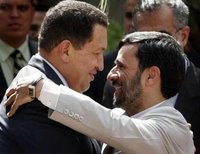
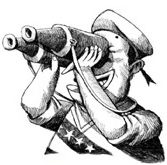
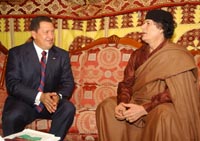
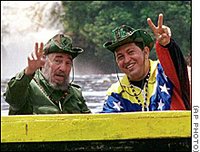
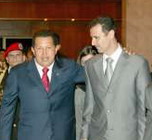
 Site feed
Site feed 